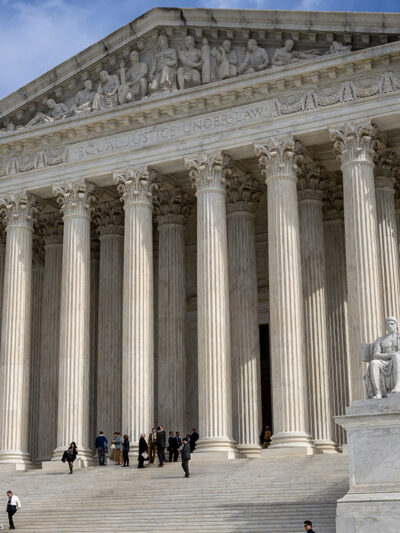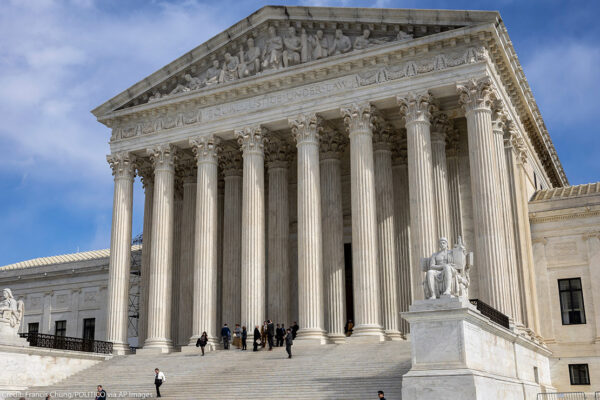Be Prepared: Immigration Enforcement in Maine
Know your rights and make a plan in case you encounter immigration agents in Maine.
Robbins v. State of Maine – Protecting the Right to Counsel
- Filed: March 1, 2022
- Status: Active
- Court: Maine Supreme Judicial Court
- Latest Update: Jan 08, 2026

We're suing the state for failing to provide effective legal assistance to people who cannot afford their own attorney – just as the Sixth Amendment demands. A person’s freedom should never depend on their wealth.
Maine is failing to uphold the Sixth Amendment right to effective assistance of counsel for people who cannot afford their own attorney – so we sued. After years of litigation, the Kennebec County Superior Court ruled in favor of the ACLU of Maine.
On Jan. 3, 2025, after years of litigation, the Kennebec County Superior Court ruled that the State of Maine is violating the Sixth Amendment rights of hundreds of people across the state by failing to provide attorneys to people charged with a crime. The court wrote that the “Sixth Amendment demands continuous representation in Maine from the time the right attaches, and at all stages of the criminal process.”
The Sixth Amendment to the U.S. Constitution guarantees all people charged with a crime the right to effective assistance of counsel. Maine has failed to uphold that promise and remains the only state in the nation that relies almost entirely on private attorneys for this essential public service. The state provides little oversight and resources, tipping the scales of justice against the people. The current system has failed low-income people accused of a crime in Maine and violated their Sixth Amendment right to effective assistance of counsel. A person’s freedom should never depend on their wealth.
We sued the state in 2022, in Robbins v. Maine Commission on Indigent Legal Services. (The case is now named Robbins v. State of Maine.) Since then, the constitutional crisis has only escalated: not only are thousands of people in Maine being denied adequate assistance of counsel, but hundreds of people are not being provided with attorneys at all.
A three-day bench trial was held starting Jan. 22, 2025, which included arguments from the ACLU of Maine and the state on proposed remedies for Maine’s widespread failure to provide counsel at all in violation of the Sixth Amendment. We asked the court to order remedies similar to what courts in Massachusetts and Oregon have done when confronted with similar Sixth Amendment crises: If the state does not provide counsel to our class members within seven days, the court should order release from jail with appropriate conditions, and if the state still fails to provide counsel within 45 days, the case should be dismissed without prejudice (meaning the case could be brought again when counsel is available).
On March 7, 2025, the court ruled in favor of the ACLU of Maine and its proposed remedies. In May, the court began hearings to consider releasing people who have been jailed and denied counsel for over 14 days or charged and denied counsel for over 60 days.
However, the State of Maine appealed the court's ruling, and on June 20, 2025, the Maine Supreme Judicial Court paused habeas hearings and expedited the appeal process.
The Law Court heard arguments in one part of the state's appeal on Oct. 7, 2025. That appeal concerned the superior court's rulings that the state was violating the Sixth Amendment and must release certain people jailed without counsel.
On Jan. 8, 2026, the Law Court will hear a separate appeal from the state asserting that the "State of Maine" should not be a named defendant in the case.
Read on for a detailed history of the case’s twists and turns.
Case History:
July 2022: Class Action Lawsuit
The ACLU of Maine filed this class action lawsuit in state court on behalf of plaintiffs who have been deprived of their constitutional right to the effective assistance of counsel. The court granted the case class-action status in July 2022, allowing our clients to represent a class of thousands of indigent defendants in Maine who are entitled to court-appointed counsel.
The lawsuit alleged that the state’s systemic failures deprive indigent defendants facing criminal proceedings in Maine of their Sixth Amendment right to the effective assistance of counsel. The court rejected the state’s request to dismiss the case. This moved the case forward to pre-trial discovery, allowing us to request written evidence and witness testimony from the state about its indigent defense program.
Fall 2023: Escalating Crisis and Returning to Litigation
Since the lawsuit was originally filed on March 1, 2022, matters have become gravely worse. Not only are thousands of people in Maine being denied adequate assistance of counsel, but hundreds of people are not being provided with attorneys at all.
As a result of this escalating crisis, in March 2024, the court denied the parties’ proposed settlement agreement and ordered the parties to return to litigation on a two-phase schedule. The first phase will focus on whether the state has denied class members the right to counsel by failing to provide them with an attorney. The second phase will focus on the systemic lack of supervision, training, and support that risk leaving people with ineffective assistance of counsel.
Spring 2024: Expanded Claims, Appeal, and Delay
On March 8, we filed an amended lawsuit expanding our claims against the state for denial of the right to counsel. Our amended lawsuit added new facts and legal claims focused on the escalating crisis of people being charged with a crime and then waiting weeks and even months before getting an attorney.
On March 15, the state opposed our motion to expand the lawsuit. Later that same day, the state also filed an appeal asking the Law Court to reverse the court’s order setting the case for trial in June and denying preliminary settlement approval. On May 8, the Law Court denied the state's appeal. The case returned to Kennebec County Superior Court. Due to the state's appeal delaying the case, the trial wouldn't happen in June, as previously scheduled.
Summer 2024: Court Allows Expanded Lawsuit to Proceed, Trial Scheduled for December 2024
On May 23, the court allowed the ACLU of Maine to name the Attorney General and the State of Maine and sue the state over ineffective assistance of counsel, lack of counsel, and unlawful imprisonment.
Our amended lawsuit, filed on May 31, 2024:
- Named the attorney general and the State of Maine as new defendants.
- Updated the factual and legal allegations to address Maine’s worsening crisis. These new allegations focused on the state’s failure to provide attorneys to low-income defendants within a reasonable period after arrest.
- Added unlawful detention (habeas corpus) claims against county sheriffs and the state for unconstitutionally imprisoning indigent defendants without providing counsel.
In June 2024, the Attorney General, the State of Maine, and the Maine Commission on Public Defense Services (formerly the Maine Commission on Indigent Legal Services) asked that the court dismiss the case against them. On Aug. 13, the Kennebec County Superior Court dismissed the Attorney General from the case but allowed the ACLU of Maine to name the ‘State of Maine’ as a defendant, rejecting the state’s claim that it “enjoys absolute immunity.”
Fall 2024: The ACLU files a motion for Summary Judgement.
On Nov. 22, 2024, the ACLU of Maine filed a motion for summary judgment, stating that the material facts and evidence in the case were indisputable, and could be ruled on by a judge without going to trial.
January 3, 2025: Ruling
On Jan. 3, the Kennebec County Superior Court ruled the State of Maine is violating the Sixth Amendment rights of hundreds of people by failing to provide attorneys to people charged with a crime.
The court’s ruling makes it clear: When the state chooses to charge a person with a crime, it is the state's responsibility to provide counsel to those who cannot afford an attorney. The Sixth Amendment demands continuous representation in Maine from the time the right attaches, and at all stages of the criminal process. The State of Maine must remedy this lapse in our constitutional protections.
Read the court's decision here or in the PDF at the bottom of this page.
January 22, 2025: Bench Trial
A three-day bench trial was held from Jan. 22-25, which included arguments from the ACLU of Maine and the state on proposed remedies for Maine’s widespread Sixth Amendment violations.
Among several things, the ACLU of Maine asked the court to:
- Declare the Maine Commission on Public Defense Services (MCPDS) is violating the Sixth Amendment
- Order MCPDS to provide counsel from the time a person is charged through all stages of the criminal process, including plea negotiations, bail hearings, and pretrial investigation
- Order MCPDS to submit a detailed plan within 30 days explaining how it will meet its Sixth Amendment obligations
Lastly, we asked for remedies under the habeas corpus clause of the Constitution, which protects people from illegal restrictions on their liberty. We’re asking the Court to order remedies similar to what courts in Massachusetts and Oregon have done when confronted with similar Sixth Amendment crises: If the state does not provide counsel to our class members within seven days, the court should order release from jail with appropriate conditions, and if the state still fails to provide counsel within 45 days, the case should be dismissed without prejudice (meaning the case could be brought again when counsel is available).
March 7, 2025: Ruling
On March 7, 2025, the Kennebec County Superior Court ruled that the state must provide legal counsel to people charged with a crime who cannot afford their own attorney. It ordered the state to create a plan to end this ongoing constitutional crisis.
The court ruled that:
- The Maine Commission on Public Defense Services (MCPDS) has failed to provide counsel “in violation of the Sixth Amendment to the United States Constitution.” The court wrote the ACLU of Maine "produced credible and compelling evidence of irreparable harm caused by the MCPDS Defendants’ failure to provide continuous representation at all critical stages of the criminal process.”
- MCPDS must provide continuous legal representation to people charged with a crime and present a plan to the court on how it will do so by April 3, 2025.
- The state must end the illegal detention of people who have been incarcerated for more than 14 days after their initial appearance or arraignment. No person should be incarcerated pretrial – when they are presumed innocent – without their right to counsel.
- The state must dismiss charges, without prejudice, against people who have been denied counsel for more than 60 days after their initial appearance or arraignment. The charges could be brought again once MCPDS is able to provide counsel.
March 27, 2025: Appeal
In late March, the state appealed the court's ruling and asked that the court pause all habeas proceedings pending their appeal.
May 7, 2025: The Court Proceeds With Habeas Hearings
After considering legal arguments from the state and the ACLU of Maine, the court decided to move forward with the habeas proceedings while the state appeal.
June 20, 2025: Hearings Paused Pending Appeal
On June 20, the Maine Supreme Judicial Court paused the implementation of relief for people without an attorney, and expedited the appeal process. The court scheduled the case to be heard in early October 2025.
October 7, 2025: Oral Arguments at Maine Supreme Court
The Maine Supreme Judicial Court heard arguments in the government's appeal of the superior court ruling finding widespread Sixth Amendment violations and ordering some people released from jail if they continued to be denied counsel.
In a brief to the Law Court, the ACLU of Maine noted that the U.S. and Maine Constitutions require states to “provide effective representation through qualified and competent counsel consistent with the federal and state constitutions.” The brief argued that Maine’s “failure to satisfy this charge – first by providing inadequately-supervised lawyers, and later by not providing lawyers at all – led to this litigation.” It asserted that undisputed evidence, including from the state’s own witnesses, “proved beyond cavil that the MCDPS Defendants failed to fulfill” the Sixth Amendment’s guarantee of counsel and violated “well-established Supreme Court precedent.”
In another brief to the Law Court, the ACLU of Maine wrote that “the trial court properly ordered meaningful habeas remedies to address the State’s complete failure to provide counsel to hundreds of indigent criminal defendants as required by the Sixth Amendment.” In appealing the trial court’s order, “the State’s answer – sit tight, continue with the status quo, and maybe things will work themselves out – makes a mockery of the Sixth Amendment’s promise of a fair justice system,” the brief continued.
January 8, 2025: Additional Arguments at Maine Supreme Court
Maine's highest court heard arguments in another appeal from the government. The State of Maine is asserting that it cannot be named as a defendant in the case, claiming it is shielded by sovereign immunity. Read more about the appeal here.
A Growing Maine Crisis
As of mid-January 2025, there were nearly 1,000 cases without representation. Over the prior 12 months, several hundred people have remained behind bars while being denied their right to an attorney. The people who have been denied counsel are legally innocent, yet many are incarcerated before trial simply because they cannot afford bail. It is always wrong to incarcerate legally innocent people, particularly when they are denied their right to counsel. Click here to take a deeper dive into the staggering statistics that make up this growing crisis.
- Appeal 2 – Government's Appeal of Naming "State of Maine" as Defendant
-
- 12/08/2025 – State of Maine Response to ACLU of Maine Opposition Brief
- 11/12/2025 – ACLU of Maine Opposition Brief
- 10/24/2025 – State of Maine Opening Appeal Brief
Robbins v. State of Maine – Protecting the Right to Counsel Legal Documents12/08/2025 – State of Maine Response to ACLU of Maine Opposition BriefDate Filed: 12/08/2025
Court: Maine Supreme Judicial Court
Affiliate: ME
Download documentRobbins v. State of Maine – Protecting the Right to Counsel Legal Documents11/12/2025 – ACLU of Maine Opposition BriefDate Filed: 11/12/2025
Court: Maine Supreme Judicial Court
Affiliate: ME
Download documentRobbins v. State of Maine – Protecting the Right to Counsel Legal Documents10/24/2025 – State of Maine Opening Appeal BriefDate Filed: 10/24/2025
Court: Maine Supreme Judicial Court
Affiliate: ME
Download document - Appeal 1 – Government's Appeal of Orders Finding Sixth Amendment Violations, Ordering Certain People Released from Jail
-
- 09/12/2025 – State of Maine Reply to ACLU of Maine Opposition
- 09/12/2025 – MCPDS Reply to ACLU of Maine Opposition
- 08/29/2025 – ACLU of Maine Opposition Reply Brief to State of Maine Appeal
- 08/29/2025 – ACLU of Maine Opposition Reply Brief to MCPDS
- 07/28/2025 – Appellants' Brief
- 07/25/2025 – Party of Interest Brief
Robbins v. State of Maine – Protecting the Right to Counsel Legal Documents09/12/2025 – State of Maine Reply to ACLU of Maine OppositionDate Filed: 09/12/2025
Court: Maine Supreme Judicial Court
Affiliate: ME
Download documentRobbins v. State of Maine – Protecting the Right to Counsel Legal Documents09/12/2025 – MCPDS Reply to ACLU of Maine OppositionDate Filed: 09/12/2025
Court: Maine Supreme Judicial Court
Affiliate: ME
Download documentRobbins v. State of Maine – Protecting the Right to Counsel Legal Documents08/29/2025 – ACLU of Maine Opposition Reply Brief to State of Maine AppealDate Filed: 08/29/2025
Court: Maine Supreme Judicial Court
Affiliate: ME
Download documentRobbins v. State of Maine – Protecting the Right to Counsel Legal Documents08/29/2025 – ACLU of Maine Opposition Reply Brief to MCPDSDate Filed: 08/29/2025
Court: Maine Supreme Judicial Court
Affiliate: ME
Download documentRobbins v. State of Maine – Protecting the Right to Counsel Legal Documents07/28/2025 – Appellants' BriefDate Filed: 07/28/2025
Court: Maine Supreme Judicial Court
Affiliate: ME
Download documentRobbins v. State of Maine – Protecting the Right to Counsel Legal Documents07/25/2025 – Party of Interest BriefDate Filed: 07/25/2025
Court: Maine Supreme Judicial Court
Affiliate: ME
Download document
- 04/03/2025 Defendants' Response to Injunctive Order After Phase One
- 03/07/2025 Robbins Order after Phase One Trial
- 01/03/2025 Robbins Decision
- 08/13/2024 Superior Court Order on Motions to Dismiss
- 05/31/2024 First Amended Complaint
- 05/23/2024 Kennebec County Superior Court Order Allowing Expanded Lawsuit
- 05/01/2024 Law Court Order Dismissing State Appeal
- 04/01/2024 ACLU of Maine Reply in Support of ACLU of Maine Motion to Dismiss Appeal
- 03/27/2024 State of Maine Opposition to ACLU's Motion to Dismiss Appeal
- 03/20/2024 ACLU of Maine Motion to Dismiss Appeal
- 03/15/2024 State of Maine Opposition to ACLU's Amended Lawsuit
- 03/15/2024 State of Maine Notice of Appeal
- 03/08/2024 ACLU Amended Lawsuit to Return to Litigation
- 02/27/2024 Court Order to Return to Litigation
- 01/22/2024 Joint Memo in Support of Settlement Approval
- 11/28/2023 Amended Proposed Settlement Agreement
- 09/13/2023 Court Order Denying Settlement Approval
- 08/21/2023 Proposed Settlement Agreement
- 07/13/2022 Court Order Granting Class Certification
- 06/02/2022 Court Order Denying State Motion to Dismiss
- 04/08/2022 State Motion to Dismiss Case
- 03/01/2022 ACLU Motion for Class Certification
- 03/01/2022 ACLU Initial Lawsuit Against State of Maine
Date Filed: 04/03/2025
Court: Kennebec County Superior Court
Affiliate: ME
Download documentDate Filed: 03/07/2025
Court: Kennebec County Superior Court
Affiliate: ME
Download documentDate Filed: 01/03/2025
Court: Kennebec County Superior Court
Affiliate: ME
Download documentDate Filed: 08/13/2024
Court: Kennebec County Superior Court
Affiliate: ME
Download documentDate Filed: 05/31/2024
Court: Kennebec County Superior Court
Affiliate: ME
Download documentDate Filed: 05/23/2024
Court: Kennebec County Superior Court
Affiliate: ME
Download documentDate Filed: 05/01/2024
Court: Kennebec County Superior Court
Affiliate: ME
Download documentDate Filed: 04/01/2024
Court: Kennebec County Superior Court
Affiliate: ME
Download documentDate Filed: 03/27/2024
Court: Kennebec County Superior Court
Affiliate: ME
Download documentDate Filed: 03/20/2024
Court: Kennebec County Superior Court
Affiliate: ME
Download documentDate Filed: 03/15/2024
Court: Kennebec County Superior Court
Affiliate: ME
Download documentDate Filed: 03/15/2024
Court: Kennebec County Superior Court
Affiliate: ME
Download documentDate Filed: 03/08/2024
Court: Kennebec County Superior Court
Affiliate: ME
Download documentDate Filed: 02/27/2024
Court: Kennebec County Superior Court
Affiliate: ME
Download documentDate Filed: 01/22/2024
Court: Kennebec County Superior Court
Affiliate: ME
Download documentDate Filed: 11/28/2023
Court: Kennebec County Superior Court
Affiliate: ME
Download documentDate Filed: 09/13/2023
Court: Kennebec County Superior Court
Affiliate: ME
Download documentDate Filed: 08/21/2023
Court: Kennebec County Superior Court
Affiliate: ME
Download documentDate Filed: 07/13/2022
Court: Kennebec County Superior Court
Affiliate: ME
Download documentDate Filed: 06/02/2022
Court: Kennebec County Superior Court
Affiliate: ME
Download documentDate Filed: 04/08/2022
Court: Kennebec County Superior Court
Affiliate: ME
Download documentDate Filed: 03/01/2022
Court: Kennebec County Superior Court
Affiliate: ME
Download documentDate Filed: 03/01/2022
Court: Kennebec County Superior Court
Affiliate: ME
Download documentWe're Heading to Maine's Highest Court


What a Landmark Ruling Means for Public Defense in Maine
By Zachary Heiden


A Growing Crisis: The Right to Counsel Denied in Maine
By Carol Garvan, Zachary Heiden, Samuel Crankshaw, Nell Shea


Learn More About the Issues in This Case
Related News & Podcasts

We're Heading to Maine's Highest Court

- Criminal Legal Reform
What a Landmark Ruling Means for Public Defense in Maine
Stay Informed
Sign up to be the first to hear about how to take action.
By completing this form, I agree to receive occasional emails per the terms of the ACLU’s privacy statement.
By completing this form, I agree to receive occasional emails per the terms of the ACLU’s privacy statement.


